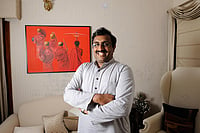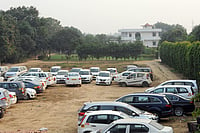A Turn In Bisada
- A new forensic report has said that the meat found with Akhlaq’s family was beef, triggering raw emotions
- In Bisada, Dadri, villagers demand action against the family, release of men held for his murder last year
- Emboldened villagers equate Akhlaq’s murder with the rights of the cow, and warn of an agitation
***
Everyone in Bisada village of Dadri speaks earnestly of Hindu-Muslim unity. But they speak on their side of a hard line, beyond which violence seems a terrible but inevitable option. “Akhlaq was like a brother. When I went out of town, he’d keep an eye on my house,” says Akhlaq’s neighbour. His pink house shares a boundary with Akhlaq’s abandoned blue one. He says they knew each other for long. “But if the forensic report says there was beef, and on WhatsApp I saw photos of a dead cow, then this had to happen....,” he trails off, too uncomfortable to push his argument further.
Moolchand Sharma too says he knew Akhlaq. Sitting on a charpoy, he says nonchalantly, “Yes, he died, but who will speak for the cow’s rights? The cow is defenceless and can’t stand up for itself.”
Moolchand’s view exemplifies the boundary, and it’s the enshrined cow that delineates it. It has been nine months since Akhlaq was lynched in Bisada on the suspicion that he had kept beef in his house. Now that the court has released the October 2015 forensic report which said that the meat samples found were in fact beef, it has enraged and emboldened the village. Residents organised a maha panchayat at the village temple, threatening to start an agitation if an FIR isn’t filed against Akhlaq’s family for possessing beef (it’s a criminal offence in UP to do so). Furthermore, they want the 18 people arrested for his murder to be released. They take the forensic report as a vindication of the lynching.
That cattle is important for Bisada is evident—nearly every house has a shed attached where a buffalo or two are snoozing. Mounds of dried cowdung lie neatly stacked. Children play around the shed and elderly women clean it. Cattle is vital for the village economy, and is entwined in its religious and cultural life. The sensitive issue of ‘gau mata’ is one that lends itself to communal, and thus political, overtones.
A large group of men are milling around the temple—a roughly made blue shed with a pink domed structure in the middle of a square plot. Sitting under a painted sign that says ‘Na gundaraaj, na brashtachar, ab ki baar, BJP sarkaar’, Om Mahesh too speaks of the decades of Hindu-Muslim friendship and their non-political nature. “We don’t allow politicians here. Sanjay Rana is only a BJP supporter. Sangeet Som comes here because his relative lives here.” His reference is to Rana, a BJP leader, whose son Vishal is among the 18 arrested for Akhlaq’s murder. Som has been infamous for his inflammatory comments during the Muzaffarnagar riots; soon after Akhlaq’s death he addressed a crowd, goading them to give a ‘strong reply’. The temple is the socio-political nerve-centre of Bisada—it was from here that the call to lynch Akhlaq was given last year, besides hosting this week’s panchayat.
Om Mahesh and Om Prakash Singh, both elderly, lead the discussion. “We will fight,” says Singh. “Marna or maarne ke liye tayyaar hai,” he says. “Depends on the time. We will fight whatever it takes—maybe by lathi or kushti.” And Mahesh adds, “When we start our andolan, why should it only be here in Bisada? It will span the whole country.”
By the end of the evening, they had calmed down. “Our andolan wil be peaceful. We will fight constitutionally and against the government,” says Mahesh. However, not losing sight of their immediate demands, he thunders: “Arrest the Muslim family. And release the 18 innocent people arrested. If they are guilty, let CBI investigate.”
It might be a fruitful exercise to further interrogate the inherent contradictions in this collective wisdom. How did such avowed communal harmony in Bisada snap and take a terrible turn that September night? If, as most testify, Akhlaq lived peacefully, “why would he one day get so bold as to do this,” asks his brother Jaan Mohammed. How come the law-abiding, peace-loving villagers didn’t refer the alleged possession of beef to the police; why are they now spoiling for a struggle if their demands are not met?
In Bisada, it doesn’t matter whether the sample was taken from Akhlaq’s house or collected from the road. Nor whether it was actually beef at all. UP chief minister Akhilesh Yadav too has tried to suggest that Akhlaq’s murder needs to be accounted for as a crime, but the killers are yet to be charged. All that doesn’t matter. What does matter is that the forensic report now supports the view that a cow was killed. All due process takes a back-seat for villagers once this sacrosanct line is perceived to be violated. Bisada leaders have little faith in the UP police; they have set their sights on the CBI. “We have moved the court to let CBI investigate,” says Mahesh. And any question on Akhlaq’s fate is countered with that of the cow.
The villagers have a sympathiser in BJP UP chief Keshav Prasad Maurya. “UP law prohibits killing humans and cows. The law must be followed for the cow slaughter too. Innocent people are jailed for killing Akhlaq. What happened in Muzaffarnagar is happening in Dadri,” he says.
The villagers have their own versions of the murder itself. No one says they were present that night. Ingenious excuses are offered on behalf of the youth. “Akhlaq saw the crowd of Hindus and had a heart attack,” says Singh. “He fell and hurt his head,” says Mahesh. Shekhar Singh pipes in, “Akhlaq’s family has relatives in Pakistan, did you know?” He is surprised that this itself is not incriminatory. For most in Bisada, Moolchand Sharma sums it up when he parrots the familiar line, “Akhlaq got justice—18 of our young men were arrested and he’s getting media attention. But the cow has had no justice.”
Jaan Mohammed is among voices drowned by those mouthing majority indignation. “This report does not reduce the criminality of the murder. People are trying to get Hindus and Muslims to face each other in the street. Hindus seem to be mobilising but Muslims should not rise to this bait of politics,” he says.
By Anoo Bhuyan in Dadri, Uttar Pradesh


















.jpg?w=200&auto=format%2Ccompress&fit=max)







